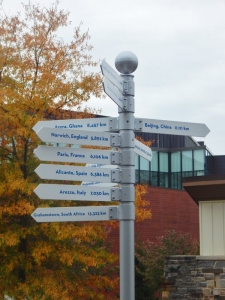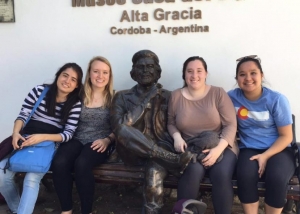What is the Role of Study Abroad at Goucher?

Since 2006, Goucher College has required all undergraduate students to study abroad. Last year marks the tenth anniversary for the shift in campus experience, now a significant selling point for the college. But what does it mean to label ourselves “Number One in Study Abroad”? How does that translate to our everyday campus life?
Calla Fuqua (’18) believes, “Study abroad is one of the main reasons people go here. They see it’s required. That sticks out.” There is by no means, a be-all-end-all easy explanation for the role study abroad plays on our campus. More than anything, perhaps there needs to be a larger conversation about why it exists and what that means for each member of the Goucher community. As Fuqua said, it makes us stick out. But what dynamic does that create on campus?
The Goucher undergraduate population is over 1,400 students. Of the population, we interviewed eight students who have different relationships with study abroad – those who have not yet gone, those who are currently abroad, those who have recently returned and are in their first semester back, and those who have been back for a bit longer and are currently in their second + semester back.
A.J. Bhadai (’18) explains, “It’s [study abroad] a major cultural importance for our small community. Everyone is exiting the United States and entering new communities and new cultures and everyone has different interactions and experiences.” If study abroad is a large part of our Goucher identity and, to some extent, a significant part of our personal journey through college, how do we, as a community, want to engage with this part of our self?
Laura Williams (’17) put it nicely by saying, “It [study abroad] served me as a way to take what I had learned at Goucher and either apply it in a different context, or build upon it.” There is an interconnection between time at Goucher before study abroad, the time abroad, and the time returning to Goucher, jumping into the world beyond our undergraduate experience. Jess Solomon (‘18) mentions, “Study abroad was very important to me at Goucher, as I felt it was important to leave ‘the bubble’.”
Solomon raises an incredibly intriguing tension by referencing the “Goucher Bubble”. The bubble implies different realities for different people and generally implies a sense of insulation. What’s insulating about Goucher, in light of the travel each student is required to partake in? Sam Goldberg, a philosophy major and creative writing minor, suggested that the requirement of study abroad brings to light the union of “here” and “there.” In other words, the “there” of different ideas and places is brought very close to the “here” of Goucher. Do our experiences abroad lead to the sensation that Goucher is only one facet of a much larger world of meaning spanning the physical, mental, emotional and spiritual spectrum of possibility? Are we left in limbo of recognizing “here” and “there” but never quite being sure where we are?
Erin Snyder (‘17) also mentioned the Goucher bubble, saying, “It’s hard because people don’t talk about it [study abroad]. I see it as a way to get us out of the Goucher bubble…I love Goucher but you get so immersed in it, in the bubble – it’s [study abroad] a breath of air.”
Study abroad also serves as what Williams calls “a mental vacation”. Andrew Rowland (‘18) also mentioned this idea, saying that many students may look to study abroad as a space for “limited obligation”.
These ideas seem to imply a value of refreshing one’s mindset. Are our mindsets refreshed when we return from abroad? Rowland thinks some people believe it’s supposed to be a life-changing experience, while Solomon mentioned that before going abroad, she heard from upperclassmen “how transformative it was for them”. Do we want to bring to light the change people undergo and the meaning behind “a life changing experience” ? Midori Fujitani (’17) states, “I think the biggest thing that students get is diverse perspectives by going to countries they’ve never been to.”
Do these changes in perspective come from a change in the pace of life we’re used to, as a shift from our norm? As Williams put it, “Study abroad as a concept has been a role model in the sense it normalizes being different.” Back to the question of the role of study abroad, Emma Minkoff (‘17) reflected that upon returning to Goucher from her time abroad, she now thinks about Goucher differently. Her experience deeply contrasts her Goucher pace of life. But once back, it’s easy to brush over the experience and the transition of returning to Goucher. How many times have we asked, “How was it?”, and left it at that?
Snyder states, “Its [study abroad’s] role is to push you out of your comfort zone when you get comfortable or too comfortable – it pushes you to learn a little more – it gives you a larger sense of responsibility as a person and as a person navigating the world. So you don’t move through the world and not know your impact.” Williams also speaks to this point, saying, “Traveling to a different context and being able to function there and make something of myself inspires me to go out and have the confidence to make something of myself wherever I go.”
If study abroad means to push us out of our comfort zone, then the role it plays is a force both brutal and transformative. But do we have the language to speak about it? It takes a larger conversation to discuss something so personal, so broad, so fundamentally a part of our campus and yet paradoxically distant from the time we spend here. It deserves a larger conversation; we want to be a part of it, and we want you to speak up too.
This article is not to prove a point; this article is to say this is messy to talk about. Let this be a brainstorm, an attempt to weave our voices together. But upon returning to school next semester, we want to invite you to workshopping sessions in order to articulate our goals as students who study abroad.
More information to come but in the meantime: Have questions? Want to talk? Contact me at majoh007@mail.goucher.edu .
MEG JOHN & ANNA YOUNG


